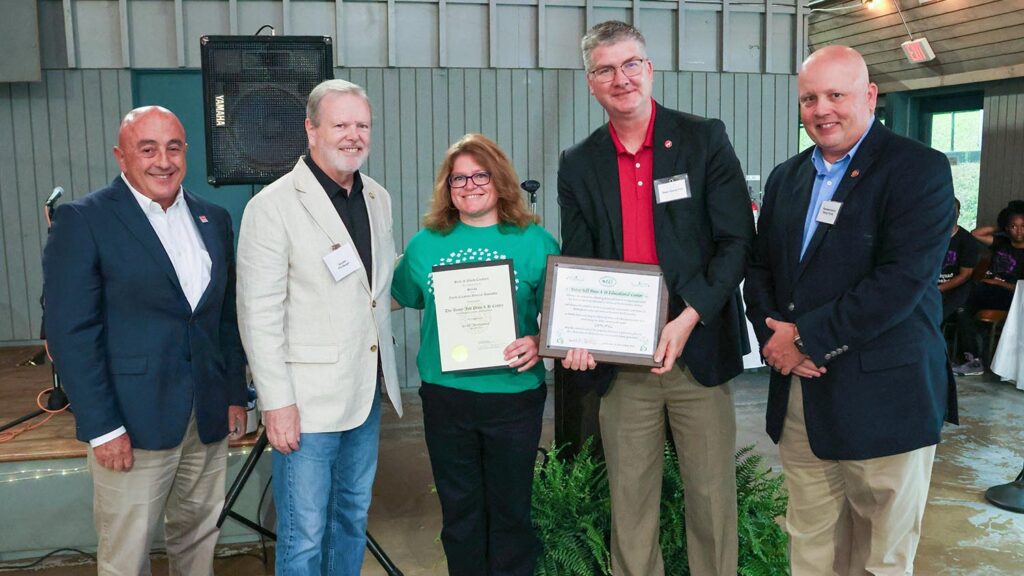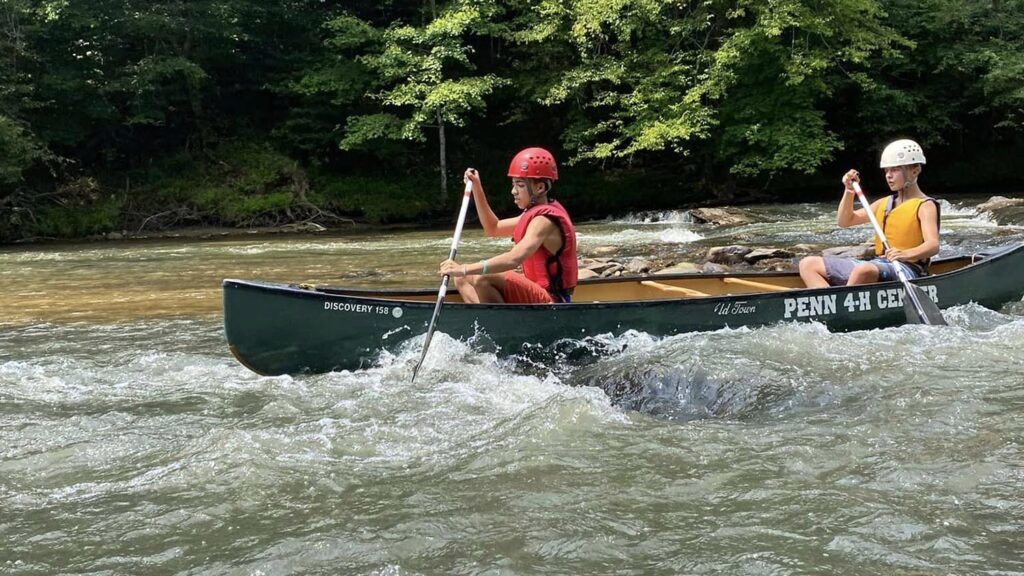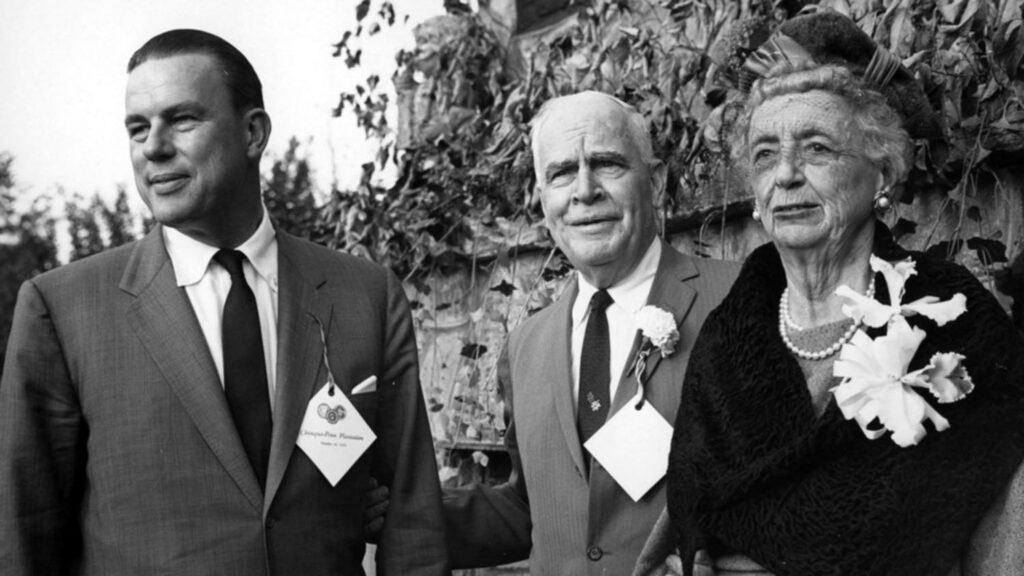NC State’s Betsy-Jeff Penn 4-H Center Turns 60
go.ncsu.edu/readext?1006546
en Español / em Português
El inglés es el idioma de control de esta página. En la medida en que haya algún conflicto entre la traducción al inglés y la traducción, el inglés prevalece.
Al hacer clic en el enlace de traducción se activa un servicio de traducción gratuito para convertir la página al español. Al igual que con cualquier traducción por Internet, la conversión no es sensible al contexto y puede que no traduzca el texto en su significado original. NC State Extension no garantiza la exactitud del texto traducido. Por favor, tenga en cuenta que algunas aplicaciones y/o servicios pueden no funcionar como se espera cuando se traducen.
Português
Inglês é o idioma de controle desta página. Na medida que haja algum conflito entre o texto original em Inglês e a tradução, o Inglês prevalece.
Ao clicar no link de tradução, um serviço gratuito de tradução será ativado para converter a página para o Português. Como em qualquer tradução pela internet, a conversão não é sensivel ao contexto e pode não ocorrer a tradução para o significado orginal. O serviço de Extensão da Carolina do Norte (NC State Extension) não garante a exatidão do texto traduzido. Por favor, observe que algumas funções ou serviços podem não funcionar como esperado após a tradução.
English
English is the controlling language of this page. To the extent there is any conflict between the English text and the translation, English controls.
Clicking on the translation link activates a free translation service to convert the page to Spanish. As with any Internet translation, the conversion is not context-sensitive and may not translate the text to its original meaning. NC State Extension does not guarantee the accuracy of the translated text. Please note that some applications and/or services may not function as expected when translated.
Collapse ▲Six decades ago, philanthropist Betsy Penn envisioned a place where young people from Rockingham County and throughout North Carolina could come to enjoy the outdoors and learn about nature.
She constructed a facility on nearly 200 acres of forests, lakes, streams and fields outside Reidsville in Rockingham County and donated it to the state of North Carolina in 1964 in honor of her late husband, Jefferson Penn.
“Mrs. Betsy” gave detailed instructions of how what is now the Betsy-Jeff Penn 4-H Educational Center should be utilized. It was to be operated by NC State University for the purpose of providing research-based educational experiences that would develop the life skills necessary for youth to become productive members of society.
“She had a tender place in her heart for children,” center director Stacy Burns said. “She had built a Girl Scout camp in Rockingham County prior to this in the ‘50s. She always supported families. This was just another step in that direction, but a much grander step. She never had children. She created this huge place to be like, OK these are all going to be my children.”
Today, the Betsy-Jeff Penn 4-H Center is one of the premier youth camps in the nation, in large part because it remains true to the founding ideals.
“When we go back and look at the dedication of the center, we’re still in line with her original vision,” said Angela Brisson, assistant director for 4-H camps with NC State Extension. “It was to be a center solely focused on the well-being of young people, to get them out in nature. I think her spirit infuses this place and is part of the magic that happens here and keeps it going 60 years later. The transformative power of this camp gets passed on to the next generation every summer and with every field trip we have out here.”

NC State Extension Director Rich Bonanno, state Senate Leader Phil Berger, Betsy-Jeff Penn 4-H Center Director Stacy Burns, CALS Dean Garey Fox, and North Carolina Rep. Reece Pyrtle with certificates presented to the center to commemorate the 60th anniversary.
On May 18, officials from NC State University and the North Carolina legislature joined local politicians, judges, camp staff, former campers and community members for Betsy’s Bash, a celebration of the 60th anniversary of the Betsy-Jeff Penn Center.
“Among the thousands of 4-H efforts taking place statewide, there may be no finer example of our mission, impact and legacy than the Betsy-Jeff Penn 4-H Educational Center,” said Rich Bonanno, director of NC State Extension. “Betsy-Jeff Penn is a shining star within Extension’s 4-H camping system, serving over 7,000 youth every year. I’m sure that if Betsy and Jeff were here, they would be very, very proud.”
The celebration of the camp’s 60th anniversary was also a fundraiser, with much of the donations earmarked for scholarships for youth who would otherwise have difficulty affording summer camp fees.
“This has been one of our very successful 4-H camps for decades and there are youth that come here every year who can’t afford to pay for camp,” NC State Extension’s 4-H state program leader Mike Yoder said. “We raise funds to help those young people get the same experience others do. And that’s really why we’re here. Young people need the experiences they get while at camp probably more than they ever have.”
Summer camping season begins in June. Thousands of youth ages 8-17 will enjoy outdoor activities and life-changing experiences at NC State Extension’s three 4-H camps, the Betsy-Jeff Penn Center, the Eastern 4-H Center in Tyrrell County, and Millstone 4-H Camp in Richmond County.
These days, summer camp can seem like an anachronism. Much has changed since Betsy Penn founded her namesake camp in 1964. Young people are immersed in technology and scheduled activities. But that, Extension’s 4-H experts say, makes camping more relevant than ever.
“Camp is really more important than it ever has been because it lets kids be kids,” said Brisson, who attended Betsy-Jeff Penn as a youth and met her husband there when working on staff. “They’ve got so much going on in their lives. This really simplifies things. They don’t have to worry about all the big life challenges that some of these young people see outside of camp. They just have to worry about tying their shoes and making up their bed in the morning. You can see their stress and anxiety levels lower as they get back to just being a kid for a week.”
Related: Our State Magazine features the Betsy-Jeff Penn 4-H Center
Campers can swim, fish, paddle a canoe, practice archery, hike, climb a wall, tackle a ropes course and search for crawdads, all at a place that encourages them to learn about and respect nature.
“It’s ecological life-skills awareness,” Burns said. “It gives them an opportunity to develop self confidence. It’s really based on the leadership model of 4-H of experiential education.”

Canoeing is one of the many fun activities that instill confidence in NC-4H campers.
Burns is passionate about the center and the role it plays in children’s lives. She sees its impact first-hand, week after week.
“Camp has the power to change somebody,” she said. “It’s immersive. It’s experiential. You’re living it, so you have to be brave in a variety of ways. All of those experiences compounded into one week are so very powerful. I canoed, I swam, I touched a fish, I performed at talent show. Terrified, but I did it. Now that child owns that experience. These are real things that create self-efficacy, that can be referred back to for the rest of your life. It’s not a fleeting thing that disappears if you lose a USB drive. It’s real. No one can take that from you.”
Betsy Penn’s vision of a place where youth could enjoy the outdoors extends well beyond the summer camp. In the spring and the fall, the center plays host to school groups that come for overnight trips. About 2,500 students from as far away as Haywood and Union counties participated in programs in the spring.
“It’s a really great program for middle school kids,” Burns said. “It teaches conflict resolution, it teaches them team building. It gives them the opportunity to work with their classmates, especially if you’re in a feeder middle school where you have all these kids who never went to school together and they all came from five different schools.”
Related: Betsy Penn’s legacy of generosity
The Penns’ legacy extends beyond the 4-H center. They were wealthy world travelers, but they also farmed the land. Their trips to exotic locations including Mongolia and Africa were planned around planting and harvest seasons.

Betsy Penn with her nephew, Paul Schoellkopf, and Gov. Luther Hodges after donating her Chinqua-Penn Plantation to the state of North Carolina in 1959. The land now houses the Betsy-Jeff Penn 4-H Center and NC State’s Upper Piedmont Research Station.
When Jeff Penn died in 1946, Betsy continued to live an active life. She was friends with Gov. Luther Hodges and William Friday, who became the head of the University of North Carolina system in 1956. Robert Shoffner, the director of NC State Extension, was a good friend.
Those associations prompted her to donate the 1,000-plus acre Chinqua-Penn Plantation to the UNC system in 1959. UNC Greensboro originally ran the estate, and NC State took over management in 1986. The land is now home to NC State’s Upper Piedmont Research Station as well as the Betsy-Jeff Penn Center.
“She was a very smart, thoughtful woman,” Burns said. “We teach the kids about her. She was really intentional, especially at the time where the world was a little tumultuous. She was such a good example of community and philanthropy.”

